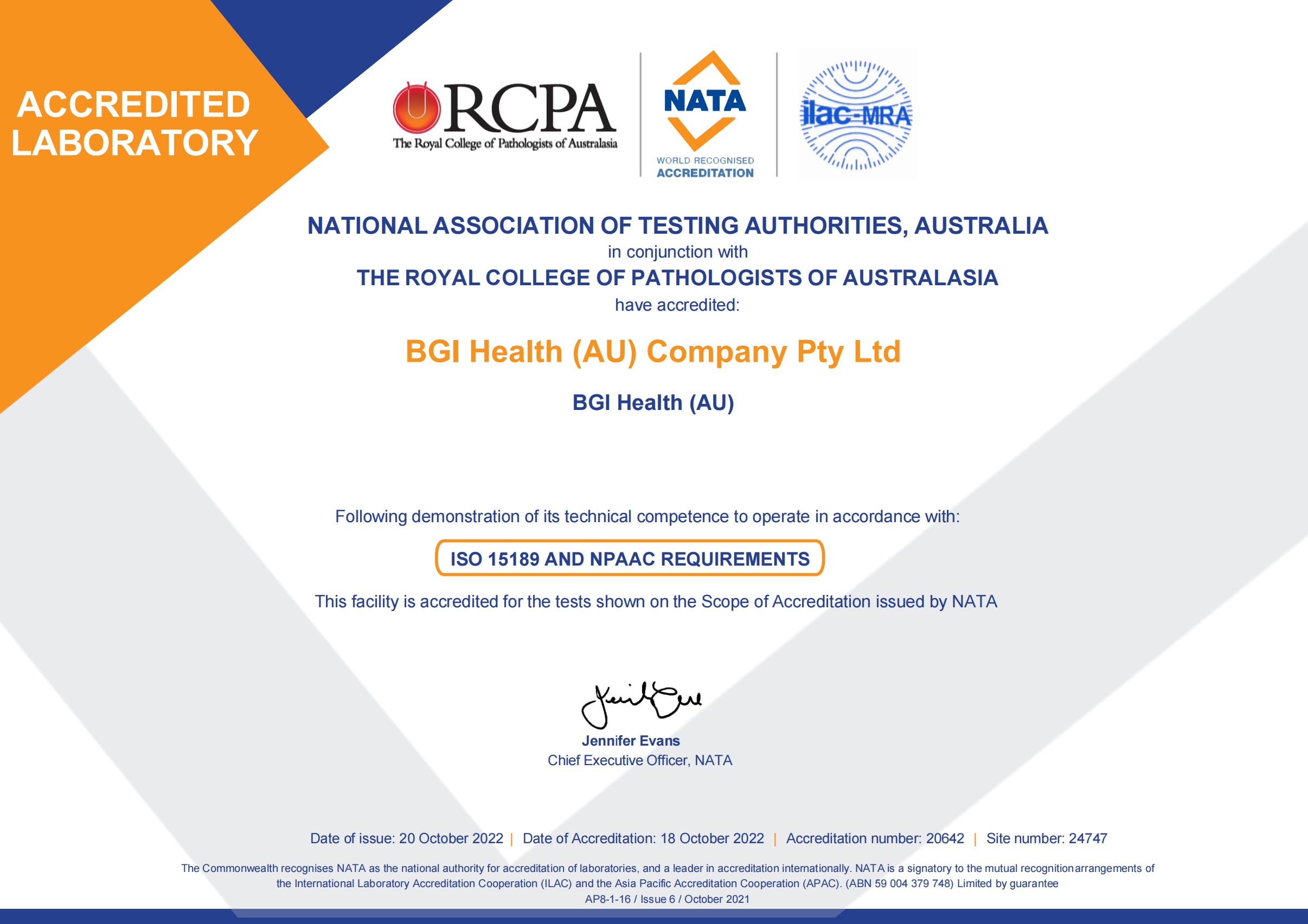Brisbane, 20 October 2022 – BGI Australia’s lab has achieved accreditation from the National Association of Testing Authorities (NATA) to perform clinical Whole Exome Sequencing in Australia, paving the way for the global life sciences company to provide clinical sequencing services for identifying possible disease-causing genetic changes.

The lab will start to provide clinical services in Australia for the first time after receiving NATA’s Human Pathology Laboratory Accreditation, adding to the numerous regulatory approvals that BGI Group has received for its global labs and operations. The NATA accreditation adopts the internationally-recognised ISO 15189 and meets the accreditation standards for pathology laboratories set by the National Pathology Accreditation Advisory Council (NPAAC).
“As a world-class life sciences organization, BGI Group continues to lead the development of the industry, including a strong emphasis on quality management,” said Dr. Ye Yin, CEO of BGI Group. “We will continue to simultaneously develop science, technology, standards, quality and intellectual property, with the aim of driving further developments that improve the health of mankind.”
The 460 square metre BGI Australia laboratory, located at the QIMR Berghofer Medical Research Institute in Brisbane, has been empowering Australian researchers in their life sciences research projects. The NATA-accredited clinical Whole Exome Sequencing service will expand the lab’s services to a broader community. The Whole Exome Sequencing services will be conducted on MGI DNBSEQ-G400 sequencers, a high-throughput genetic sequencer that has been approved by the Therapeutic Goods Administration (TGA), the medicine and therapeutic regulatory agency of the Australian government.
The accreditation helps BGI Australia to provide services to clinical labs, hospitals, and other partners to detect changes in the exome that contribute to rare genetic and paediatric diseases. Building on lessons from the accreditation process, BGI Australia will look to expand its testing scope and demonstrate its capabilities in clinical solutions, as well as seek partnerships in technology transfer to make testing more accessible to the community.
“NATA’s accreditation procedures are extremely rigorous, and it is a significant achievement that our laboratory, the MGI DNBSEQ-G400 platform that performs clinical Whole Exome Sequencing, and the procedures implemented by our technicians have qualified for the NATA accreditation,” said Dr. Bicheng Yang, Director of BGI Australia. “We will continue to improve and increase the accessibility of clinical sequencing to clinical laboratories, research institutes and hospitals.”
Everything has to meet NATA’s quality system requirements, including a four-layer document system of Quality Management, Quality Procedure, Standard Operating Procedures, and Record Management. To ensure continued compliance to all quality standards, the laboratory will be regularly reviewed by NATA.
Data communication, storage and the process for data deletion are a critical part of NATA’s accreditation of the lab, which operates a closed loop system. All of the lab’s data are stored in Australia. BGI Australia must maintain NPAAC criteria for the preservation and deletion of data involved in the process.
Globally, BGI Group has more than 100 international quality system certifications, which govern how its laboratories operate and ensure the company meet all local regulations, particularly around data regulation and personal privacy.
All the exons in a genome are known as the exome, which is the part of an individual’s genetic blueprint that provides instructions for making proteins. The majority of genetic changes currently known to cause disease occur in, or very close to, exons, therefore sequencing the exome is a valuable diagnostic tool.
Whole Exome Sequencing is an efficient, economical and frequently used genome sequencing method, shown to increase diagnostic yield compared to classical diagnostic methods. It has already been established as a critical part of genetic detection and clinical diagnosis, and, if employed early enough, has been demonstrated to reduce the diagnostic odyssey (number of tests and time to diagnosis) for a substantial proportion of patients.
NATA, the world’s oldest accreditation body, is Australia’s leading independent accreditation organisation for assessing the ability of laboratories to perform clinical sample analysis services, and ISO 15189 is an international standard that contains requirements for diagnostic labs to demonstrate competence to deliver timely, accurate and reliable results. The multi-month accreditation process required BGI Australia to meet independent assessment of the laboratory, including personnel competence, equipment, quality assurance of process controls and sample handling, plus data security and confidentiality.
“The BGI Australia local staff are some of the highest quality I have worked with,” said Dr. Peter Kaub, a genetic pathologist and medical consultant to BGI Australia for clinical Whole Exome Sequencing. “Receiving accreditation means that they can now service clinical Whole Exome Sequencing for any laboratories or hospitals that require it. This is the biggest growth area in medicine and any extra testing capacity is important as it may allow more patients to get results in a more timely manner.”



